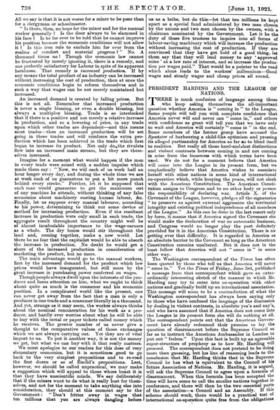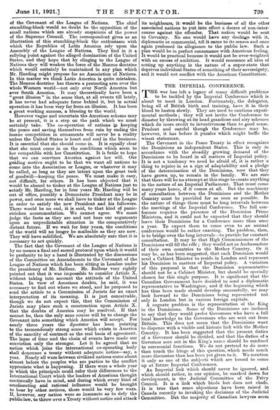PRESIDENT HARDING AND THE LEAGUE OF NATIONS. T HERE is much
confusion of language' among those who keep asking themselves the all-important question whether America is " coming in " to the League. Some people will tell you with complete confidence that America never will and never can " come in," and others with confidence as great will tell you that we have only to wait and America will certainly come in " in the end. Some members of the former group have accused the Spectator of harbouring a child-like optimism and pressing its alleged partisanship for America so far as to blind itself to realities. But really all these hard-and-fast distinctions and violent contrasts between coming in and not coming in arise from the looseness with which terms have been used. We do not for a moment believe that America will come into the League in its present form, but we emphatically believe that America wishes to associate herself with other nations in some kind of international co-operation which, while keeping the peace, will not clash with the American Constitution. The American Consti- tution assigns to Congress and to no other body or person the responsibility of declaring war. Article X. of the Covenant of the League, however, pledges all the signatories " to preserve as against external aggression the territorial integrity and existing political independence of all members of the League." As this can he done in the last resort only by force, it means that if America signed the Covenant she would make the declaration of war an automatic business, and Congress would no longer play the part definitely provided for it in the American Constitution. There is no getting over that difficulty. It is regarded in America as an absolute barrier to the Covenant so long as the American Constitution remains unaltered. But it does not in the least follow that America will not " come in " in some other way.
The Washington correspondent of the Times has often been quoted by those who tell us that America will never " come in." Yet the Times of Friday, June 3rd, published a message from that correspondent which gave an extra- ordinarily interesting sketch of the manner in which Mr. Harding may try to enter into co-operation with other nations and gradually build up an international association. This message will seem to be a contradiction of what the Washington correspondent has always been saying only to those who have confused the language of the discussion by dealing in violent contrasts, in absolute yea's and nay's, and who have assumed that if America does not come into the League in its present form she will do nothing at all. The correspondent points out that the American Govern- ment have already redeemed their promise to lay the question of disarmament before the Supreme Council so far as to instruct the American Ambassador in London to put out " feelers." Upon this fact is built up an agreeable super-structure of prophecy as to how Mr. Harding will proceed. The correspondent does not pretend to be doing more than guessing, but his line of reasoning leads to the conclusion that Mr. Harding thinks that in the Supreme Council he has what is equivalent to the Council of his future Association of Nations. Mr. Harding, it is argued, will ask the Supreme Council to agree upon a formula of disarmament. When this formula has been accepted the time will have oome to call the smaller nations together in conference, and there will then be the two essential parts of the association—a Council and an Assembly. If this scheme should work, there would be a practical test of international co-operation quite free from the obligations of the Covenant of the League of Nations. The chief stumbling-block would no doubt be the opposition of the small nations which are already suspicious of the power of the Supreme Council. The correspondent gives as an illustration of this stumbling-block the enthusiasm with which the Republics of Latin America rely upon the Assembly of the League of Nations. They find in it a rallying point against the alleged domination of the United States, and they hope that by clinging to the League of Nations they will weaken the force of the Monroe doctrine which would certainly be maintained in any plan which Mr. Harding might propose for an Association of Nations. In this matter we think Latin America is quite mistaken. The Monroe doctrine has thrown a protecting arm over the whole Western world—not only over North America but over South America. It may theoretically have been a " great illusion " in the sense that, at all events till lately, it has never had adequate force behind it, but in actual operation it has been very far from an illusion. It has been a great working success, a blessing to the world. However vague and uncertain the American scheme may be at present, it is a step on the path which we must certainly take. The co-operation of nations in keeping the peace and saving themselves from ruin by ending the insane competition in armaments will never be a reality unless the United States is heart and soul in the business.
It is essential that she should come in. It is equally clear that she must come in on the conditions which seem to her compatible with her Constitution. It is futile to hope that we can convince America against her will. Our guiding motive ought to be that we want all nations to come into the Association or League, or whatever it may be called, so long as they are intent upon the great task of goodwill—keeping the peace. We must make it easy, not difficult, for others. It has been objected that it would be absurd to tinker at the League of Nations just to satisfy Mr. Harding, for in four years Mr. Harding will be out of office, possibly a Democratic President may be in power, and once more we shall have to tinker at the League in order to satisfy the new President and his followers.
There would be no end, it is said, to that kind of panic- stricken accommodation. We cannot agree. We must judge the facts as they are and not base our arguments upon an unpredictable situation in the comparatively distant future. If we wait for four years, the conditions of the world will no longer be malleable as they are now. They will have solidified. We are absolutely sure that it is necessary to act quickly.
The fact that the Covenant of the League of Nations is by no means a final and sacred protocol upon which it would be profanity to lay a hand is illustrated by the discussions of the Committee on Amendments to the Covenant of the League of Nations which has been sitting in London under the presidency of Mr. Balfour. Mr. Balfour very rightly pointed out that it was impossible to consider Article X. without taking into account the attitude of the United States. In view of American doubts, he said, it was necessary to find out where we stood, and. he proposed to send the article to a Commission of Jurists for an exact interpretation of its meaning. It is just conceivable, though we do not expect this, that the Commission of Jurists may place such a construction upon Article X. that the doubts of America may be resolved. If that cannot be, then the only sane course will be to change the Covenant into something which America will accept. For nearly three years the Spectator has been pointing to the tremendously strong sense which exists in America of the sanctity of contract as the real basis of agreement. The lapse of time and the chain of events have made our conviction only the stronger. Let it be agreed that no nation which joins the international co-operating body 'shall denounce a treaty without adequate notioe—say, a year. Nearly all wars between civilized nations come about almost before the peoples who are parties to the conflict appreciate what is happening. If there were a whole year in which the principals could refer their differences to the International Court which the leaders of American thought continually have in mind, and during which every kind of ameliorating and rational influence would be brought to bear by other nations, there would be very few wars. If, however, any nation were so insensate as to defy the Public law, to throw over a Treaty without notice and attack its neighbours, it would be the business of all the other associated nations to put into effect a decree of non-inter- course against the offender. That nation would be sent to Coventry. No one would have any dealings with its diplomatic or commercial, till it came to its senses and once again professed its allegiance to the public law. Such a plan would be in perfect consonance with American feeling. It would be praotical because it would not be over-weighted with an excess of ambition. It would renounce all idea of setting up anything in the nature of a super-state that deprives individual States of something of their sovereignty, and it would not conflict with the American Constitution.



































 Previous page
Previous page